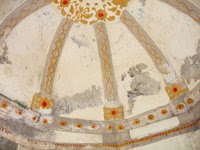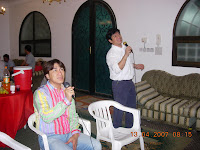
Me as a Dominican novice:
I am not in costume, he he; I thought I was called but I was not chosen.
This was in the late 80s. Back when I thought I had the calling. Maybe I had but the Dominicans did not choose me in the end. I felt so numb when it was announced, ironically, on the Feast of the Anunciation. It finally sunk in a few days later and I felt so unwanted, so useless, so unloved.
Rejection has a way of making you feel like the world is crashing, and you're at the bottom of the pit. It does not even match the feeling of being dumped.
In any case, after a period of depression and "wild" days, and of staying away from the Church, an insight seeped into my fogged mind: the Dominicans may not have chosen me but it does not necessarily mean, God didn't too.
This insight lifted my spirit and my bitterness gradually disappeared. I forgave the Dominicans and I forgave myself. I would like to think, God had forgiven me too.
My notions that I could be a priest started during my childhood years in Daraga, that town in the province of Albay in the Bicol region (south of Manila), which boasts of the majestic Mt. Mayon as a backdrop. Daraga also boasts of a beautiful church on a hilltop, dedicated to the Virgin Mary, so that the Church was officially called Our Lady of the Gate Church. Climbing the steps to get to Church was like going through a bit of hardship to get a reward.
There were three ways to go up the Church: one was through the fairly new (at that time) concrete steps, the old road and the old back road - both of which also allowed vehicles to pass. I remember that as I used to climb the concrete steps, I would pass by several houses, one of which sometimes had a band rehearsing with the usual instruments of drums and electric guitars. It was always loud and jarring but it was an entirely novel experience for me as a young boy so sometimes, I would stop and gawk.
It has been said (but I never verified it really) that the Church atop the hill was built so that it will not suffer the same fate as that of the Church in Cagsawa which got buried up to its belfry in lava during one of Mt. Mayon's legendary eruptions.
Blogger and heritage conservation advocate Ivan Henares, in his blog, Ivan About Town (www.ivanhenares.blogspot.com), describes the Church and its "uglification" thus:

Daraga Church is indeed a sight to behold with its very elaborate facade. As I mentioned earlier, if there should have been a national cultural treasure, it should be this church with its elaborately-decorated facade. But the interior is as modern as it can get an this may explain why the National Museum no longer considered the church. Only the baptistry (below) has remnants of the previous interior and you can see from the carvings on the wall, the remaining patches of paint, and the blue ceramic tiles on the floor that the inside was equally elaborate as well.We were told that a former parish priest had the interior renovated and even sold many of the priceless antiques to fund the said uglification. Horrible this [sic] priests who leave a mark by wasting church money, selling off priceless works of art which end up in private homes most of the time to pay for useless and ugly renovations so that they will be remembered.
My mother and my other siblings who were also born in Daraga (there were five of us in this "set"), made it a point to hear Mass on Sundays at this Church. We would be dressed in our finest clothes (no kidding) and my mother would sometimes get our photographs taken at a nearby studio. I also remember eating out afterwards.
But growing up, I found myself going to Church alone. Fr. Servulo San Martin, he of the Society of the Divine Word missionaries, was the Church's parish priest then. The priest was obviously a Spaniard although I never gave a thought to verifying it at that time. He was imposing, had a pinkish face and a really reddish nose. He conjured up images of the stereotypical fraile of our history books.
He had this special Mass for children at about 2:00 in the afternoon and I usually joined this Mass. As a curious child, I would wander about the Church building and the convento. I remember the convent to be really old but gleaming and polished, the staircase so wide and the balusters, massive.
As a young boy, I remember frequently gazing at the Church' ceiling during Mass as it was painted with a lot of clouds on a blue sky, a lot of men's faces with beards, a lot women in long clothes and swirling fabrics and a lot of babies and children with wings.
The rest of the Church building however, such as the parish office, was modern, having been renovated early on. Ivan was right in his lament above that the only thing original in the Church, apart from the inside of the convent that I saw, is the facade.
In renovating the Church, the altar was shifted to the side, thereby shortening the path from the door to the altar, to the consternation of brides who wished they had a longer procession on their wedding day. He he.
When I reached high school, I graduated from the 2:00 pm Masses into the 7:00 pm/evening Masses (about time huh), which were usually in English. I found the evening Masses to be more solemn too because of the low lights. And I got to read the Epistles during these Masses. I don't remember how it happened but I became a fixture at those Masses. During this time, there was already another priest who was Filipino, who was in charge.
I remember too that the evening Masses had better choirs.
When a brother got married in this Church, two things remain distinctly clear in my memory until now: the way my brother kissed his bride after they were pronounced man and wife (he tenderly cupped her chin and planted an equally gentle kiss on her lips), and my parents posing at the Church's entrance in their finest - my father in his jusi barong and my mother in her mestiza dress. They looked so sosi. My mother's dress was so elegant, that when she died a few years later, we made sure she was dressed in it.
But I completely digressed, didn't I?
I carried my Church-going habit even at my own high school. If on Sundays I will be at the Church in Daraga, on schooldays, I would be at the chapel in school, serving not only as Epistle reader at times but also as an acolyte at Mass.
In college, I became a fixture at the Church of the Risen Lord, the Catholic chapel in my university's compound. It was a special chapel, having been designed and built by Leandro Locsin who eventually became a National Artist (of the Philippines). It was a unique chapel in that it was shaped liked a spaceship and its altar has the images of Christ on the cross and Christ resurrected hanging back-to-back on a beam from the chapel's ceiling. It also had the stations of the cross painted mural-like on walls around the chapel. It was as much of an art work as it was a chapel.
It was at this chapel that I met Fr. Robert Reyes, the so-called "running priest". This was before he became the vocal activist that he had been in recent years. Last I heard, Fr. Robert has since been relocated to China.
I also assisted at this chapel, sometimes as an acolyte, sometimes as a reader and sometimes as a writer of those prayers for the community. I also got involved in some chapel-based activities even if I was never a full-time member of any chapel-based organization.
In other words, Church-going and being involved in Church activities, had always been a part of my life. In addition, I also had, or so they would tell me later, this facility with speaking to people, like I was a preacher on a pulpit. I also admired the flowing robes that some priests wore. A priest's white frock also conjured up images of purity and holiness for me.
It was not so difficult to convince me that I should try becoming a priest.
And so I did, so I did, with quite disastrous results. He he.




























